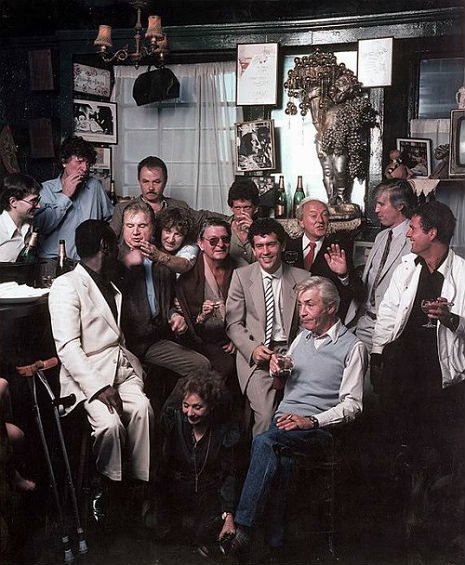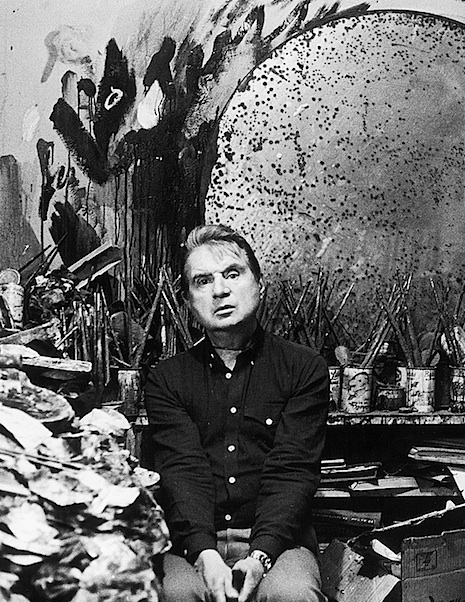
Toast of London: Francis Bacon and friends at the Colony Room
If you want to know about the artist Francis Bacon then there are his celebrated interviews with David Sylvester, two biographies by Michael Peppiatt (Anatomy of an Enigma, Francis Bacon: In Your Blood), a memoir by his longtime friend and boozing buddy Dan Farson (The Gilded Gutter Life of Francis Bacon) and a film Love is the Devil starring Derek Jacobi and Daniel Craig. Then there is this: Melvyn Bragg’s access all areas documentary with Bacon from 1985 that is one of the finest portraits of an artist ever committed to film.
What makes this South Bank Show documentary so utterly brilliant is the honesty and directness with which Bacon answers Bragg’s questions. He often pauses and considers his answer before committing himself to a reply. When he does, Bacon reveals his essence as an artist.
Bragg asks him how he paints:
‘Until the images come through you’re not in control. When they come up you have to control them.’
‘So you come up with an overall image which you don’t want to define except by working towards it?’
‘Yes…no…yes, that’s exactly how it is.’
‘You’ve thrown paint at the canvas?’
‘Once or twice. I couldn’t stand the sight of them so I just threw a pot of paint at them.’
‘You put yourself at risk.’
‘You have to, otherwise you’re an academician.’

‘When is a painting finished?’
‘I know instinctively when it’s finished. There it is…I’m always hoping chance will work in my favour. I don’t want to tell a story. I’ve no story to tell. I like the starkness of the image. I want it to give me a sensation. Shock, you could say. It’s a form of experience. A visual shock.’
‘What does your painting mean when you’ve finished?’
‘Nothing. Except what people want to read into it.. Nothing.’
Bragg always allows his subjects to present themselves as they want to be seen. Unlike too many other presenters, he does not interpose himself between the camera and the subject. He is the unseen hand who steers the ship through the storms, around the hidden rocks, towards its final destination. Bragg once told me in an interview (long, long ago) why he wore suits:
...basically because it’s easier if you are doing a television programme to wear the same thing all the time then you don’t get in the way over the programme. Another way to get people to forget about me and concentrate on the person I am talking to.
It’s advice worth heeding.
In 1985, when Francis Bacon was being hailed as the world’s greatest living artist and on the verge of his second Tate Gallery retrospective—a major feat in itself—Bragg interviewed Bacon at length about his life and art. At one point during the filming, while at lunch in Mario’s restaurant in Kensington, London, Bacon and Bragg became increasingly drunk. As Bragg later wrote in his book The South Bank Show: Final Cut:
There’s bound to be truth in cliches some of the time or they wouldn’t be. In vino veritas is less spouted now that there is less Latin about but still the notion persists that people when drunk tell the truth. That they also tell lies, come out with rubbish, destructive abuse, venom, hysterical hyperbole and all manner of degrading speech has not entirely impaired its claim. When Francis Bacon and myself appeared on The South Bank Show and for a few minutes were caught in a state of naked inebriation it provided, I think, a true insight into Francis as a man and as a painter. So I left it in the film.
As the wine flowed, Bragg asked Bacon if he paints the real world, to which the artist replied:
‘Yes! Between birth and death has always been the violence of life. I paint images of sensation. What is life but sensation?’
‘Do you think anything exists outside “the moment”?’
‘No. I believe in nothing. We are born and we die and there’s nothing else.’
‘So what do you do about it?’
‘I do nothing about it. I just drift.’
‘You paint.’
‘Yes, but my own life is just going from bar to bar and drifting, that sort of thing. I’m an optimist. But I’m an optimist about nothing. I was born with that nature.’
Bacon was seventy-five when this film was made. He had enviable stamina managing a four-hour lunch at Mario’s before climbing the rickety stairs of the notorious Colony Room, where he dispensed fifty pound notes like confetti and gargled the millionaire’s mouthwash—champagne. Throughout, Bacon is old school courteous—even when utterly pissed—and collaborates with Bragg in creating an unequaled intimate film portrait.